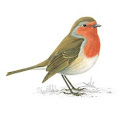Learning languages is hard. But one of the things that for me can recompense the stumbles, limited vocabulary, and awkward mistakes is that words are much more than words: they are little storehouses of memory.
When you began to speak English, it was so long ago that you can no longer remember when you learned everyday words. But in new languages, many words retain within themselves the memory of when they were first encountered, first learned, or first spoken.
I still remember some of the mnemonic devices my childhood friend Melanie and I came up with to memorize Spanish vocab lists. The word mural still evokes her face and the grassy hill we sat on when we came up with the oh-so-brilliant way to remember that "mural means wall, and you paint a mural on a wall!"
I enjoy those moments of recognition, when the meaning of a word I've heard or seen before is suddenly clarified. Only recently, I learned that nuit blanche, "white night," means a sleepless or restless night of insomnia, after having long ago attended the Nuit Blanche music festivities here in the city, and rented videos from the nighttime convenience store chain by the same name.
Often, words have buried within them the embarrassment of a major gaffe in using or trying to use it. Gafas recalls the laughter of our high school's Spanish foreign exchange student when he heard my friend and I use the word anteojos for "glasses." This was straight out of our textbook, but in Spain actually means something more like "spectacles." He taught us the correct word, gafas.
I vividly remember some of the Spanish words uttered by my husband on the first nights after I met him, the words we spoke during a breathless, impromptu vocabulary lesson. When I say the word bufanda, I always recall him grabbing his scarf on that frosty March evening. And now countless Catalan words are intimately connected to memories of him, and memories shared with him.
The word for that gruesome fish, rap (anglerfish), brings up images of the first time I saw one in all its toothy-mouthedness at the Boqueria market. The word turró, Spanish Christmas nougat, always places me back at New Year's Eve some five years ago, with friends, and the little plaza where we went to buy my first taste of it. The verb gronxar "to swing" will always be associated with the face of our then two-year-old niece when she taught it to me. (Today is her birthday! Felicitats, Sora!)
Simply hearing the "sit down" command in Spanish, siéntense, always and immediately brings me back to the first day of Spanish class in ninth grade, the excited nervousness of starting a new language. I was thrilled to be there, but scared that I wouldn't understand our teacher. I remember him walking in, and his strawberry-blonde mustache, and the way he began by saying simply siéntense as he sat down, motioning with his arms, then levántense as he stood up again, with a lifting gesture. He motioned for us to do the same, and we felt ridiculous saying the words over and over again as we stood and sat, stood and sat, but look at me: fifteen years later I still will never forget what those words mean (and I think this would be true even if I no longer actively spoke Spanish).
Some six years later, when I went to Mexico for the first time, I remember being bowled over when I heard a woman on the streets of Tijuana say "siéntate!" to her little white dog. It was the moment I realized--experientially, rather than intellectually--that this was a REAL language, and that I could use in the real world the things I had been learning for so many years in a classroom.
That trip changed once again how I used Spanish, and a host of words are linked to memories from it: the laughing face of little Luis, with whom I played "tigre," the way I learned the word for belly button, ombligo (while trying to demonstrate CPR on a plastic dummy at the health clinic)...and many more.
I love this about language. It's true that this doesn't just happen with new languages, that in your native tongue words can have immense associative powers, but I think there is something so wonderful about their specificity and the feeling of discovery word-memories can retain even as you use them a thousand times over.
To bring this back to the advent season, I remember very clearly that when the Mister first told me about this crazy Catalan Christmas tradition called the tió, I thought either he was mistranslating something or I was misunderstanding something. You whack a log? With a stick? And ask it to poop presents? And it does poop presents? I suppose no matter how much this tradition will be incorporated into our family's Christmases, the word tió for me will always contain a bit of that first incredulous shock--and amusement.
Today's advent calendar window contains pretty wrapping paper. I found it yesterday at one of my favorite shops, and although it's not strictly for Christmas, it has gold and green and red and light blue. And birds that might be quetzals. This makes me happy, as does wrapping it around presents to send to Vermont.
*I refer here to Proust's madeleine, and the flood of memories released upon biting into its crumbly sweetness.
05 December 2007
Every word a madeleine*
thoughts thunk by
Robin
at around
13:15
![]()
phylum or species: Celebrations, Language
Subscribe to:
Post Comments (Atom)

1 comment:
I've experienced the same memory association you're talking about many times before. In my 9th grade spanish class there was a redneck behind me. When the teacher was going over basic vocab and said "ingles", he said, "oh , you mean ingles it's down the street". (ingles was a grocery store). It still makes me chuckle when I hear the word.
Post a Comment